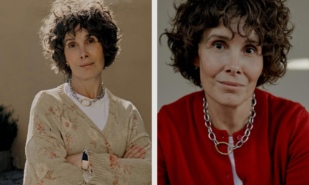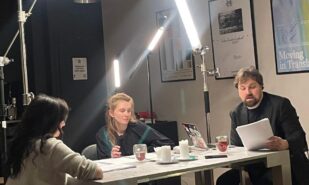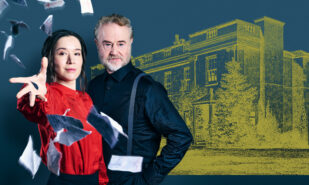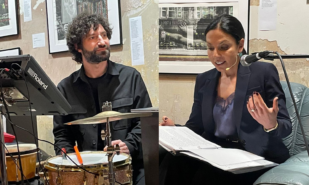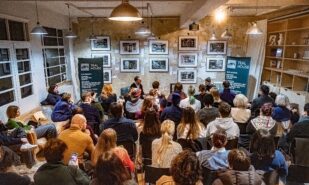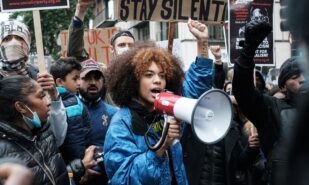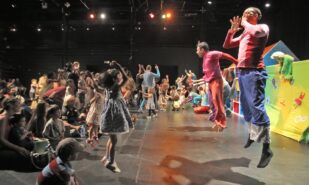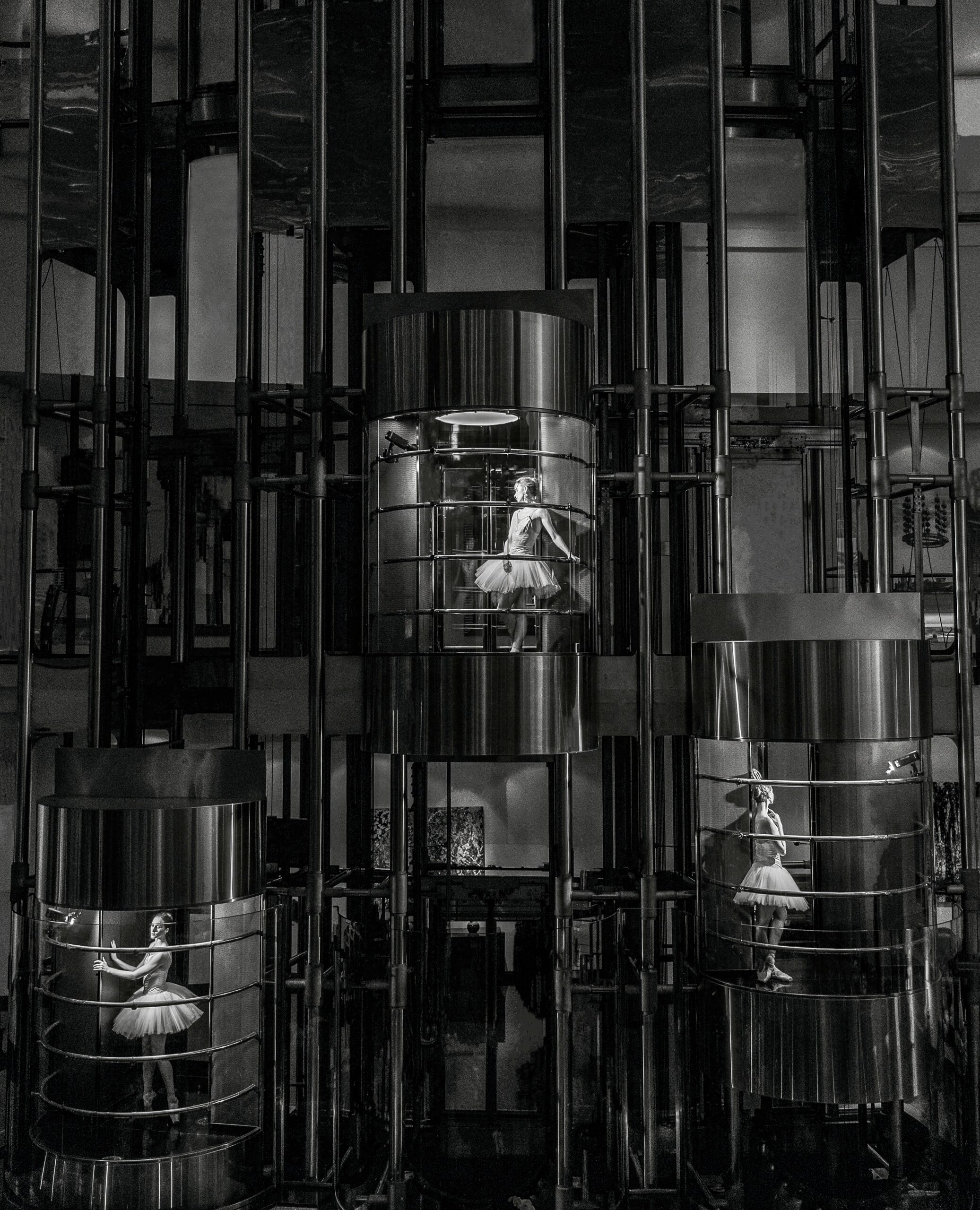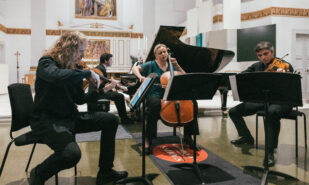A war story through a child’s perspective: a talk with the director and cast after the world premiere of “Blitz” at London Film Festival.
The London Film Festival opened with a gala screening of Steve McQueen’s *Blitz*, a film that tells the story of a nine-year-old boy named George, who embarks on an odyssey to return home to the London borough of Stepney Green. George, born to a father of African descent, lives with his mother and grandfather in the pre-war years. During the bombardment of London by German planes—a period known as “the Blitz”—George, like many other children, is evacuated by train to safer areas in the countryside. However, he manages to escape by jumping from the train.

The film captures London during this turbulent time, with night raids, residents seeking shelter in the Underground, and sudden tunnel floods, all seen through the eyes of a young boy. Along his journey, George encounters both good and bad people and, much like Dickens’ Oliver, uses his childlike wit and resourcefulness to find his way back home to his mother.
The film marks the debut of young actor Elliott Heffernan as George, with Saoirse Ronan portraying his mother. Benjamin Clementine plays Efe, a Nigerian air warden, while Stephen Graham takes on the role of a gang leader who robs corpses and shops. The cast members, along with director Steve McQueen, spoke to journalists at an informal press conference ahead of the film’s world premiere at the London Film Festival. *Blitz* is set for release in UK cinemas on November 1, 2024.
A question to McQueen. Steve, what motivation made you make this film about a war from a civilian perspective, and from a perspective of a child?
Steve McQueen: I think, again, in 2003, I went to Iraq. I was a war artist. And again, in this part of the world, to be in a war zone is pretty unusual. So there was, in theater, they say, very romantic work of being in the war zone, and being surrounded by British troops from all different parts of the UK, all different regional accents, and it was the first time I ever felt a sense of nationalism, a sense of comradery in that way. And I thought, my goodness, the only reason I’m feeling this is because of war. So it was the perversity of that, really, of that being in an environment where I thought this is my first feeling of comradery as being British, but at war, I thought to myself, that was the seed in fact of why I wanted to look at civilians and war, and I thought 1940 Britain, what was happening in my city, London. And then of course I found this photograph when I was doing research for small acts of a small black child on a railway station, in a large coach, oversized, ready to be evacuated. And I thought, who is that guy? Who is that child? And I want to see the war through his eyes. I mean, again, when, at what point do we compromise? At what point do we look away? At what point do we pretend not to hear? And I wanted to bring it back to someone who has a future. You know I’m trying to clear the path for my children and other people’s children. That’s my job, that’s all our job, that’s all our, you know, that’s what we’re here to do, obviously, to make it better for the people coming behind us. And when I saw this photograph I just thought, I want to see, I want to start with almost a blank piece of paper. I’m going to start from that child’s perspective to see the events clearly, and also to refocus. And then thanks God I found this gentleman here.

A question to Elliott Heffernan. Elliot, let’s bring you in here, because you are the center of the film. It is your first film. And you are also central to the whole idea. So when you’re working with Siorse, and you started out pretty young, how did it go?
Elliott Heffernan. I mean, when we first met, it was just kind of a bond from the first sight, it all worked out very well. We did a first rehearsal and it was as if we knew each other for years.
Steve McQueen. Did you hear him? You need to listen to him. You could be a small genius. No, listen, you know, you can’t force love, you can’t force admiration, you can’t force a certain kind of a bond. And it was so beautiful. It was just so beautiful to see these two come together. And, you know, it was just like, oh, okay, well, action. And the same with Paul Weller. You know, Paul, it was beautiful to see a 66-year-old man, a 29-year-old woman, a 9-year-old boy, just loving being together and having respect for each other. It wasn’t about sort of having some kind of dominance, sort of, you know, I’m older, so I have more authority. There have been rare occasions where I could just say ‘action’ and sit back and smile, and hope it is focused and does it sound all right, then cut, okay next, and it’ll be beautiful, it was great to experience that.
A question to Saoirse: Saoirse, women in the war, something that we look back on as a slightly different perspective now knowing about what happened later, they were so important, weren’t they? I mean, there was such an intersection between actual physical support, because they were working at factories, and emotional support.
Saoirse Ronan. Yes, women had a core power within their home. Taking Rita, for example, someone who has a child to take care of, a family to look after, a single father to provide for. They also had to step into the role of men when they left, and it was, I’m sure, incredibly trying for these young women who were in their 20s. So much was being expected of them. The change that happened culturally, the change was so kind of seismic. And I think for myself and the other female actors, for all of us to know what was going to happen but to sort of keep it in the present was an incredibly exciting part of the story to bring to life, because we knew how pivotal this moment was in history for all of us.
A question to Benjamin Clementine. Benjamin, your character, the Nigerian warden Efe, he is based on a real person, right?
Benjamin Clementine. Yes, Efe is the real Nigerian character, his name is Etan Epaynhan and he was born in 1899 and moved to England before the 40s. He wanted to pursue a career in law but eventually when war broke he decided to become an airy warden. He was actually also a bit of an aspiring actor because he worked with Paul Robeson.
A question to Stephen Graham. Your character, Stephen, is a part of this extraordinary gang who go around, you have great form of playing some bad characters in the past, but this is somebody whose behaviour is still deeply, deeply shocking to us in the 21st century and that could have happened then and now.
Stephen Graham. Yeah, you know, he’s a product of his environment. He’s a survivor of the First World War. That was the beauty of what Steve did, he gave us a plethora of information about how normal people coped and navigated their way through that whole experience. You know, there was a lot of literature, there were a lot of photographs. We just talked about it and I think what we all wanted to do, our job, our obligation was to try and be as truthful as possible, play our parts and the characters within the story through this young boy’s eyes, and to show the both extremes of war, you know, the vulgarity and the depravity we go through as human beings, as a society. Yet in the same respect, you know, what you said about coming together and women being a strong force behind it. After that Café de Paris has been bombed – I never saw it until I saw how beautiful that whole sequence was, and at the same time that is disgusting because you have people of high society sitting there drinking champagne and eating foie gras, and you know what is going on outside when there are people dying and there are bombs going off. I think that is just as disgusting as my people trying to survive taking the jewellery off the dead. You know, to show the balance. I think that’s what Steve’s done beautifully. We were brought up watching those nice films about the Blitz, but I’ve never seen this vision that Steve brought to the screen. I’ve never seen it from this perspective, which is much more of a kaleidoscope. I found my place in it. It was an honour to be a part of it.
A question to McQueen. Steve, but this idea that some of the most extraordinary sequences in your film are the greatest things that actually happened. You know, there’s so much about that period in that film that hasn’t fitted, that goes beyond what we know.
Steve McQueen. The basis of the film involved a lot of research. When you’re going into the situation, I want to know as much as I can about a particular part of this history. I was working with the Imperial War Museum, doing research, working with the historian Joshua Levine, the author of the book ‘Secret History of the Blitz’. Going, delving deep into the research, you just find things. And it’s shallow, it’s shallow mining. It’s not like you have to dig deep. It’s just, you just see and find out certain things. I just wanted to portray a certain time in London, and unfortunately there are other places in the world like the Middle East which are going through the same situation now. And it was also a revolutionary time especially for women but also within the sphere of sexuality. People took more risks and because they took a risk they realised, my life doesn’t have to be like this, it could be different. So people after the war wanted to venture out and try new things that they would have never thought of without that particular period of time. Hopefully it’s a British epic because it is the British landscape that was completely translated and looked at. And yes, everything is based on fact. I didn’t want to tick boxes here. I wanted to tell the story of this gentleman, this boy, moving through the landscape and illuminating things which were going on. It’s part of history. As my son says, I quote him, I wasn’t reflecting, I was telling.
A question to Elliott. Did you actually perform that underwater stunt at the Tube station during the flooding?
Elliott Heffernan. On screen, it might look scary. It was really fun. You might see it. I mean, they helped me a lot with all the stunts, it was nice, the whole team of the film, they waited on me with towels and helped me. It was fun.
Steve McQueen: I must say, Elliott did all these other stunts himself, there’s only one thing in the movie that he didn’t do. One little thing. Otherwise, he did all the stunts.
A question to actors (Ronan, Clementine, Graham): The idea of playing a character who is also a child’s perception of that character, does that feature at all in your acting? Because your character, Benjamin, is that amazing figure who comes out and takes the boy from despair into something, a possibility of hope.
Steve McQueen. Well, I don’t think it’s Georges’ perception – he is this beautiful man, a beautiful person. There was no sort of trying to accommodate it.
Benjamin Clementine: I think that this film, this script, did a great job in letting us see war through the perspective of a child. Through the course of us doing our thing, I saw my own child, my own son, and I wondered if I were in a situation like war where I had to defend and protect my child, what I would have done. And so this experience with George was, in fact, a very personal experience that gives me, I suppose, an idea of how I would be if something happens and I have to defend not myself, but my children.
Saoirse Ronan. Though I had a number of scenes without Elliott, I will say that, of course, it was always incredibly important to the three of us that we were achieving truth at all times. But there was an awareness that I had as an actor, playing his mother, that I needed to have a certain amount of strength and togetherness, just even in my performance or as an actor. That was very much coming from the role that I needed to play in this little boy’s life, that Rita needed to play in this little boy’s life, that she was all he had. Not that anything was altered in terms of how the story was told, but for me playing his mother, there was definitely a way for him when I was in the scenes with him, for sure.
Stephen Graham: I’ve been very blessed to work with young actors, kids, and they all had that same beautiful quality that Elliott has. There’s kind of, there’s just a little click. You look into his eyes and you do something and you see him kind of fall into that role. I suppose there’s no ego, there’s no bravado. He’s a wonderful young lad. He really is. He’s a credit to his parents, but he’s also a credit to himself. He’s wonderful. He’s very enthusiastic. He’s, you know, it’s a hard slog. What the boy’s doing, it’s a proper bit of work. He’s first in, he’s last out. He’s all there through the day. When he’s on, he’s on, he’s there. And he’s 100%. And he’s so willing to learn. When you work with someone like him, you learn a lot yourself. So he carries himself on set. He’s a wonderful guy. He’s brilliant. And his performance is exceptional. Can we just start with clapping? You can’t get away with it because he’ll look at you as if to say, I didn’t believe that one. You’re like, oh, okay. And then Steve will go, right, get him this time. You’re like, all right, come on, let’s go.

Saoirse Ronan. Whenever I work with young people, I think it’s very easy, no matter how lucky we all feel that we do this, to get a bit jaded sometimes. And you can get a bit like, now we’ll go back into the hair and makeup trope and we’re going to do our thing. And it’s such a well-oiled machine most of the time. But when someone young comes in and it’s their first job especially, they remind you of why you did this in the first place, they remind you of all the love that you have for it and why it’s such an incredible job to have. That’s why I feel really grateful to work with young people too because it just it re-sparks something in you, to feel the excitement of what it is that we do
A question to Steve McQueen: Steve, could you talk a little bit about the significance of the place we are in now? Southbank and London. We wouldn’t be in this sort of a place without you.
Steve McQueen. I’ve been very fortunate to debut my films at Cannes, Toronto, and other cities. I’ve been very blessed. For this particular movie there was no other place in the world to debut this film. Where we are seeing the film tonight, at Southbank, there was a large explosion that happened right in front of that building. Unfortunately this movie couldn’t come at a better time for the world. I want that movie to be seen in that location, as it is a part of what I’m best at.
Question to Steve McQueen and the cast. I really enjoyed some of the more genuinely nightmarish and hellish aspects of the film, and specifically George’s interaction with them. From a storytelling point of view, but also from a performance point of view, I’m really interested to hear about any challenges that you encountered when you were trying to navigate the fact that the Blitz is a key part of British mythology, of a modern British myth. Among propaganda war films where everything is upbeat and all is going to be fine, how did you navigate trying to tell a genuinely truthful story about people’s experiences and their fears and the negative aspects of their lives. How were you trying to incorporate the fact that this is a time that has such an importance in modern British storytelling?
Steven Graham. I think one of the great moments for me was when we filmed in a snooker hall. Steve took us around the snooker hall and it felt really lovely. And then he went, you see these things on the wall? And we looked and there were cases on the wall. All these cases, like metal cases and wooden cases. And he went, there are snooker cues in there. And we were like, okay, that’s nice. And he went, they’re actually snooker cues of people that used to play snooker in this hall who went off to the war and they put their snooker cues in the cases and left them in the snooker hall for when they came back. It was a powerful moment that I’ll never forget, it felt a lot more tangible, as we were going to shoot in this hall. That is the kind of genius of Steve that story that he told us as actors just hit home really.
Steve McQueen. To answer your question in a very short way, I don’t care about the perception. I do care about the truth. That’s why I tell this story. I don’t care about a certain sense of how to navigate the myth. There’s nothing to navigate. It is not about navigating. I’m not offering anything other than the truth and a certain sense of urgency that’s all what else is there.
A question to Saoirse Ronan: You obviously played some great daughters on screen in ‘Ladybird’ and ‘The Outrun’. What was it like exploring being a mother, exploring that world and that aspect of the role a bit more in this film?

Saoirse Ronan. It was great. I mean, I sort of treated it like any other character I would play. I’ve always found that, you know, I think it’s Peter Mullen actually that says just because you’re playing a king doesn’t mean that you need to play a king. He’s still got to put his clothes on in the morning just like anyone else would. As much as I was so curious and inquisitive with the mothers around me, who I would ask about their experience anyway, I really wanted to find what mine and Elliott’s relationship was. And from the very early conversations that Steve and I were having, I knew what Steve wanted to do with this and what his process would be in terms of the character development. I knew that he would build the story around us, as he was inspired by our natural dynamics and relationships that were forming when we were getting to know each other. What naturally started to come out for the two of us was a friendship. I kind of needed to acknowledge that Rita was very young when she had George and I didn’t want to lose the sort of youth of this woman and but still we had had conversations about the loss that they’ve gone through as a family and the tragedy of losing her mother so young and having to step into that role and find this inner strength that I’m sure just kind of naturally formed over time. So it was really about just all of us deciding in the privacy of our rehearsal room, okay, who is this person, what’s she going to be and how do we build it from there? But it all felt very organic, nothing felt too contrived. I think the female actors that I’ve worked with over the years who had a natural maternal instinct, even when I was a kid like Elliott, I could tell who could do it and who couldn’t. There were the actresses who’d be like, and it was all very sort of forced, and I always vowed to never do that whenever I played a mother. I wanted it to feel real and I wanted it to represent my mother and the women that I know in my life who are incredibly wonderful people.
Yulia Savikovskaya, London Cult. A question to Steve McQueen.
Steve, thank you so much for the film. I was thinking that this method of seeing the war through the eyes of the child is not exactly new in art. You could think of ‘The Tin Drum’ by Günter Grass. Among films, we could think of Tarkovsky’s ‘Ivan’s Childhood’. And I wonder if you were aware of these films and books, were you paying homage to some of them? Were you trying to break the tradition of the previous works on a child in war?
Steve McQueen. I wasn’t really thinking of Tarkovsky with this film. But that’s of course one of the things that one has in their psyche. And what I was also interested in was the following aspect of George’s journey: an environment which had some racial issues and as much as we were fighting our enemy, we were fighting ourselves. So yes, there are a few good ones that I can think of looking through a child’s perspective, but I was interested in digging up and viewing again the reality of the environment and the reality of war that was going on here. That’s what I wanted to do, and that is where I think Tarkovsky comes in.

A question to McQueen and the cast. The film is a very precise depiction of events of the Second World War. But now we have similar events in the Middle East and the rest of the world, with mothers who are looking for their sons, children who are lost. How did the modern situation in the world influence you while working on this story?
Steve McQueen. Did recent situations have an influence on this story? Well, in some ways they didn’t, because a lot of things didn’t happen when we started production. But unfortunately we always find ourselves with that one shape, form, or the other. I was just grateful that we as a team can get people to bring to the understanding of these issues amongst all the streams of entertainment.
Saoirse. When you have to portray characters in distress and fear, among all the chaos and pandemonium, and then you turn on the radio or the TV and it is the same thing. It is the first time I really experienced a project where there is no escape from it. I hate to say it was relevant, but it felt really relevant, as I understood that this is the nature of humanity, and filming felt incredibly real.
A question to Steve McQueen. There are so many films about the Blitz. Was this film made to correct certain ideas about the Blitz?
Steve McQueen. I am an artist, I like to work on things that move me. It was a family drama – the three of them playing a piano in the beginning – and how it can console us. I am interested in the idea of how love can shine through, how our wish, our hope can shine through this nightmare. Looking at the very dark moment of our history, but finding who we are and finding love.
Steven Graham: I’ve never seen films about Blitz with a black young kid as a protagonist, never a mixed-race child in a blitz film.
Steve McQueen: And never a woman in these films doing anything useful apart from bringing a cup of tea (laughs)



